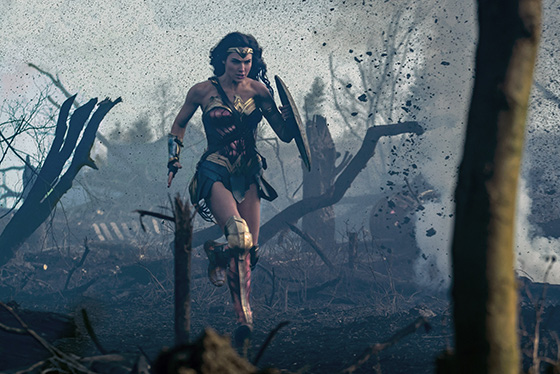Wonder Woman

GAL GADOT as Diana in WONDER WOMAN, a Warner Bros. Pictures release. Photo: Clay Enos/ TM & © DC Comics

The best thing about WONDER WOMAN will be all the little girls emulating their heroine the way I and my friends emulated Indiana Jones when we were kids. The worst thing about WONDER WOMAN is that it’s a D.C. film. The in-between isn’t great but it isn’t entirely bad, either.
Director Patty Jenkins enters into a beleaguered franchise, opposite industry giant Marvel and rather late to the game. The hope, perhaps, was that they might rush a product out ahead of CAPTAIN MARVEL and have bragging rights to being magnanimous toward women.
On the isle of Themiscira (based on the region, Themiscyra, of Greek myth) the Amazon women live, learn and train in armed combat like men of Sparta under the tutelage of Antiope (an under-utilized Robin Wright). The world of men, they believe, is corrupted by the god, Ares. Queen Hippolyta’s (Connie Nielsen) daughter, Princess Diana (Gal Gadot, also played by Lilly Aspell and Emily Carey), is born and bred for war, but raised with the Amazonian values of maintaining peace. This cannot last, as World War I falls on their doorstep, literally, when Steve Trevor’s (Chris Pine) plane crashes at their shores, followed by German battleships.
WONDER WOMAN has the temperament of Joe Johnston’s CAPTAIN AMERICA: THE FIRST AVENGER. Aside from shifting the Trevor timeline to World War I, there are benefactors (David Thewlis) and there are rogues (Saeed Taghmaoui, Ewen Bremner, Eugene Brave Rock) in a race to stop the destructive Danny Huston—err, Ludendorff, who feels too much like a Nazi caricature (Weimar Republic be damned). Destined to play villains, Huston and his congenital scowl just can’t catch a break.
Written by Allan Heinberg, Jason Fuchs, and Zack Snyder, the anemic story exsanguinates after the facile introduction to Diana’s home, the Great War, and the vaguely evil plot—to deploy a kind of mustard gas which, as far you see on screen, makes people sleepy—facilitated by a scientist, Dr. Maru (Elena Anaya), grotesquely twisted inside and out.
In spite of these challenges, uneven pacing and the weak third act (typical of Snyder), Patty Jenkins and Gal Gadot prove that Wonder Woman herself, contrary to studio excuses, is not and never was the problem. And while Chris Pine’s levity establishes a usefulness beyond what his phallic gags imply, Gadot shines in a light entirely of her own making.
She cinches Wonder Woman with the same combination of awkwardness and sincerity that made Christopher Reeve the golden standard of superheroes in Richard Donner’s SUPERMAN (1978)—note the alleyway stickup nod to to the latter.
Central to D.C.’s failures with Batman and Superman reboots is this notion that the protagonist must be miserable in equal proportion to the world around him. Marvel, then, did the obverse with Chris Evans and Captain America, first in Johnston’s love letter to American optimism, and again with a darker poignancy in the Russo brothers’ WINTER SOLDIER, testing a hero’s resolve in the darkest hour with deliberate callbacks to 3 DAYS OF THE CONDOR and THE PARALLAX VIEW. The key, as the School of Donner taught us, is that the world is a mad, cynical place, and what defines a superhero is how they never lose their nerve.
Somewhere betwixt profligate abuse of slow-motion shots of cartwheeling daredevilry, Diana Prince scolds a roomful of stodgy Brits of the War Council. As if to point a finger back at the studio executives who rationalized why audiences won’t buy into a female lead, Diana looks these men square in the eye and declares that leaders don’t make excuses and hide behind desks while sending poor, young men to die in war. Leaders, she argues, charge into battle with their troops.
To wit, it only took two women to right a ship that dozens of male D.C. executives, writers and directors, have tried their damnedest to sink.
Through every generation of the human race there has been a constant war, a war with fear. Those who have the courage to conquer it are made free and those who are conquered by it are made to suffer until they have the courage to defeat it, or death takes them.
– Alexander III of Macedon